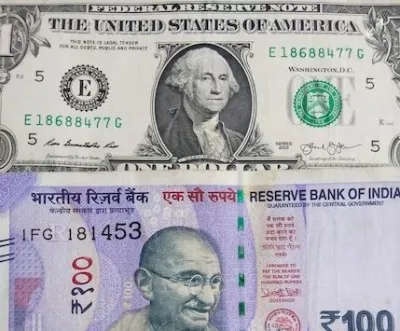Fluctuations in Rupee Expected to Have Minimal Effect on Indian Firms' Credit Profiles: Study

Synopsis
Key Takeaways
- Indian rupee fluctuations won't significantly impact credit profiles.
- Companies are well-equipped to manage increased input costs.
- Export-oriented sectors may see enhanced earnings.
- Supportive policies help cushion impacts in vulnerable sectors.
- Overall credit impact expected to neutralize over time.
Mumbai, April 8 (NationPress) Despite the recent fluctuations in the Indian rupee against the US dollar, a report released on Tuesday indicates that the overall credit profiles of Indian firms are anticipated to remain stable.
Although certain sectors may experience temporary earnings pressure, this is not expected to undermine the medium-term financial robustness of these businesses, as noted in the report by Crisil Ratings.
The report highlights that while a depreciated rupee can elevate input costs for various sectors due to increased import expenses, companies are strategically positioned to manage this transition through various methods such as subsidies, pricing strategies, and hedging practices.
Moreover, numerous exporting sectors are likely to gain from the rupee's decline, potentially enhancing their near-term earnings.
Sectors such as information technology (IT), home textiles, and marine foods are expected to benefit, as they derive a significant portion of their revenues from exports while maintaining minimal import exposure.
This could lead to improved profitability, contingent on the extent to which the benefits are conveyed to customers.
Even in industries like complex fertilisers, oil and gas, and airlines—where there is considerable exposure to imported inputs or foreign currency obligations—Crisil points out that supportive policies and hedging strategies mitigate the impact.
For example, fertiliser manufacturers benefit from government subsidies, and more than half of the lease obligations of airlines are hedged, as mentioned in the report.
Additionally, current global crude oil prices are favorable, providing further support to the oil and gas sector.
Companies in capital goods, pharmaceuticals, and renewable energy are also projected to navigate the situation effectively, with some segments even profiting from their export focus.
Conversely, sectors like chemicals, ceramics, gems and jewellery, city gas distribution, edible oils, and steel are predicted to face minimal impact as they either maintain a natural hedge through balanced import-export exposure or possess strong pricing power.
The report emphasized that while short-term earnings may exhibit fluctuations, companies are expected to adapt to the shifting currency landscape.
“The overall credit impact is likely to be neutral as it will be balanced out over the medium term once businesses adjust to the new currency levels,” the report stated.









